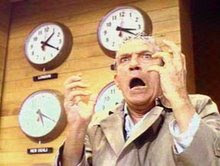I shouldn't get upset when I see news reports warning that your chances of getting some terrible ailment are increased by 40% if you do this or that. But I do. Why? It's not because I'm scared of getting that particular ailment. In fact, I don't really take that much notice of these reports. Here's why.
Here is an example I put to a few guys at the gym the other day after one of these stories appeared on the news. Give your gut feeling answer to it. Say one out of 1000 people get a pimple naturally. A study has shown that if you drink tea, your chances of getting a pimple increase by 40%. How many people out of 1000 get a pimple now. Remember, give a gut feeling answer to it. All the guys at the gym gave the answer of 400. And guess what, they were all wrong. In fact, only one point four (I'm using words rather than numbers so I don't give the game away) people get a pimple now. Remember, it's a forty percent increase. That means you multiply the number of people who get it by 140/100. In this case, that makes it one point four people.
The point is, it is not just enough to say it's an increase, you also need to the know the number of people who it really affects. 40% sounds scary, but if it really means that 0.14% get it rather that 0.1% does it still sound as scary?
For example, Here is research about the increase in risk of getting cancer if you are on HRT. The headline states there is a 60% increased risk of cancer. In reality, it means an increase from 0.23% of the population having cancer to 0.35% if you are having prolonged HRT use. This is a better indication of the risk and a more realistic number to be basing decisions on.
By the way, here is another question I gave the guys at the gym. In Melbourne, the weather on one day is totally independent of the weather that happens the next day. If there is 50% chance of rain on saturday and a 50% chance of rain on sunday, what is the chance that it will rain on the weekend? Give a gut feeling answer. I'll give the answer later.
The Skeptic Zone #908 - 1.March.2026
12 hours ago

11 comments:
Gut feeling? 50%.
But I reckon it might be 75%.
I'll second that... 75% chance of rain on the weekend.
boy, boys, boys.
Did you not do high school probability?
These are independent events.
P(rain)=P(rain sat).P(rain sun)
=0.5*0.5
=0.25
25%
ps 'door. good to have your ranting voice back on the intermanet.
I did high school maths. And I did uni maths. I never claim to remember any of it though.
However, I would liken Sandor's weather conundrum to a situation of tossing a coin twice; again, each toss of the coin is an independent event. What is the probability of a tail?
In two coin tosses, you could get TT, TH, HT or HH. Assuming it isn't a rigged coin, you have a 50% chance at either a H or a T. This means you have a 25% chance of any of TT, TH, HT or HH (50% x 50% for each) across two tosses. However, since we are only worried about the probability of a single tail across the two coin tosses, then our scenario is solved by any of the TT, TH or HT combinations i.e. three scenarios, 25% each. Thus, 75% likelihood of a tail.
Tail = rain, head = dry, toss 1 = Saturday, toss 2 = Sunday. 75% chance of rain on the weekend.
Of course, everyone on the planet has the right to laugh in my face if I missed something. Excel does all my maths for me now...
You mean there isn't 100% chance of rain this weekend?
But we so need it!
[Maybe I should have had you tutor me in math. Probability that it would have helped me - 0%]
When I asked this question at the gym, the gut response was 50%.
The answer is, as the a-man explained, 75%.
Here's a follow up puzzle. This is a soultion where the probability of raining on one day in the weekend is the same as the probability of rain during the weekend. Do you know what that probability is?
100%. Maybe. I think.
Couldn't it be 0% or 100%? Jade
Miss Jade, you're right on both accounts.
A-man, you can do better then just 'I think'. You should be able to prove it just like you did for the 50% case.
OK, fine, make me think in the afternoon then.
Let's define P(W) as the probability of rain on the weekend, P(R) as the probability of rain on a day and P(D) as the probability of dry weather on a day.
If we consider our earlier weather scenario, we know that:
P(W) = P(R).P(R) + P(R).P(D) + P(D).P(R)
However, in our new scenario, we also now know that P(W) = P(R). Thus:
P(R) = P(R).P(R) + P(R).P(D) + P(D).P(R)
We also know that P(D) + P(R) = 1, since we assume that the weather on any day will be either dry or wet. Thus, P(D) = 1 - P(R).
Our formula is now:
P(R) = P(R).P(R) + P(R).[1 - P(R)] + [1 - P(R)].P(R)
P(R) = P(R).P(R) + P(R) - P(R).P(R) + P(R) - P(R).P(R)
Re-arranging this formula, we get:
P(R).P(R) = P(R)
Technically, this gives us P(R) = 1 (leaving P(D) = 0). However, P(R) = 0 will also solve this formula (leaving P(D) = 1).
A, that was the most horrific thing I ever skimmed over. (Not read.)
Post a Comment